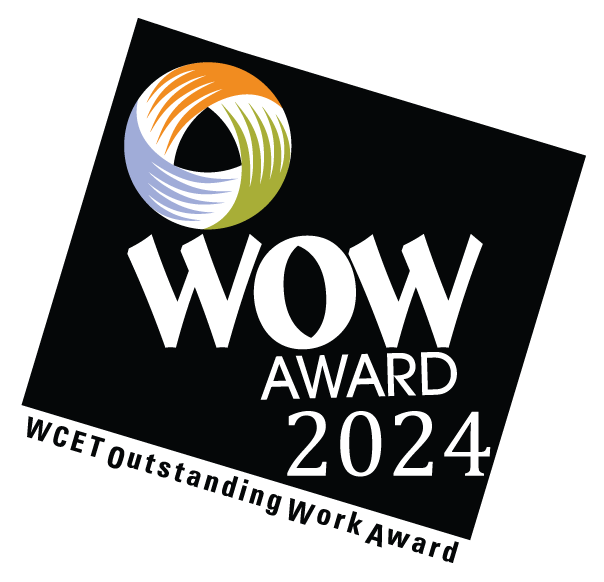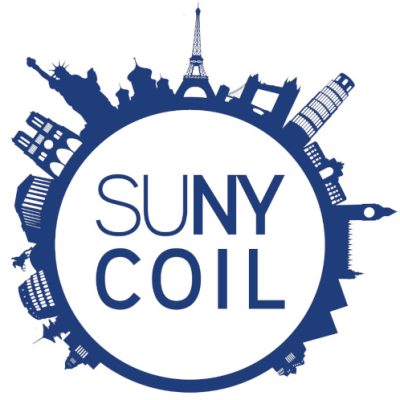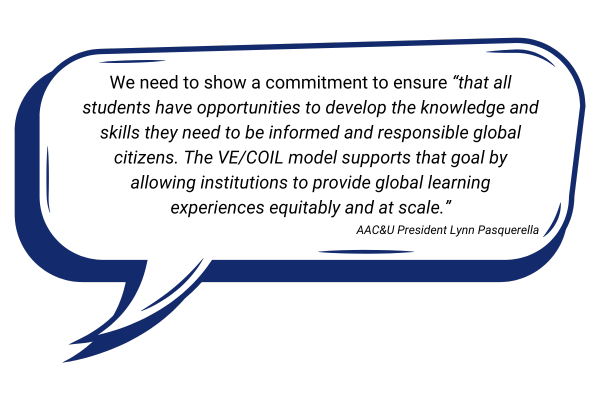Enhancing Global Virtual Learning: SUNY COIL+OSCQR Standards
Published by: WCET | 9/26/2024
Tags: Digital Learning, Distance Education, Global, Open Educational Resources, Student Success, WCET, WOW Award
Published by: WCET | 9/26/2024
Tags: Digital Learning, Distance Education, Global, Open Educational Resources, Student Success, WCET, WOW Award
Each year, the WCET Awards Program highlights innovative practices in higher education digital learning, honoring individuals and teams that have dedicated their time and effort to advancing our field.

Coordinating this program is one of the highlights of my role, especially because it allows me to work with the WCET Outstanding Work (WOW) Award recipients.
From the beginning of our “awards season,” where we receive nominations and work with our amazing volunteer judges, I am consistently in awe of the nominated projects and initiatives. The innovation happening in higher education is truly inspiring. This year, we are thrilled to feature our four WOW Award recipients, whose work is not just innovative, but also impactful.
I want to thank each of the individuals and teams that submitted a nomination. You’re all doing inspirational and vital work, and narrowing it down to just four awardees was no easy task.
Congratulations to this year’s WOW Award Winners:
We’re kicking off the series with a post from Alex Pickett, the Director of Online Teaching with SUNY Online, to share about the COIL + OSCQR Standards, which were developed through a collaboration between several SUNY organizations. Be sure to follow along throughout the month to learn more about our other honorees, and join us in celebrating them at the Annual Meeting in Long Beach in just a few weeks!
Enjoy the read and enjoy your day,
Lindsey Downs, WCET

SUNY Maritime, SUNY Oneonta, Nassau Community College & the Universidad Catolica Andres Bello in Venezuela, together with the SUNY Collaborative Online International Learning (COIL) Center & SUNY Online, have designed a set of COIL+OSCQR standards that have been incorporated into the SUNY Online OSCQR rubric.
These COIL-centered standards support Virtual Exchange (VE) & intercultural online learning experiences.
Colleges and universities are seeking new ways to provide students with global competencies that complement traditional forms of physical mobility and academic exchange. Virtual exchange, including one of its most comprehensive forms, collaborative online international learning, is an innovative educational model for meeting this growing need. Using novel teaching approaches that foster online student and faculty collaboration, the VE/COIL approach connects students and classrooms around the world through co-taught multicultural and blended online coursework that bridges physical distance.
– American Association of Colleges and Universities, 2022
Collaborative Online International Learning (COIL) Virtual Exchange is a unique way of incorporating an international experience into a curriculum as learners engage with peers from another country, culture, and context. Virtual Exchange (VE) collaborations have become a prevalent part of Higher Education’s inclusive, high-impact practices in the U.S., Latin America, and beyond.
A set of COIL+OSCQR standards has been designed to supplement and extend the online course quality standards found in the SUNY Online OSCQR rubric. These research-based pedagogical approaches and best practices focus on virtual international exchange and the design of intercultural online learning experiences. With support from a SUNY Innovative Instructional Technology Grant (IITG) and in collaboration with the SUNY Collaborative Online International Learning (COIL) Center and SUNY Online, a team of SUNY instructional designers and researchers developed the COIL+OSCQR standards. These standards have been incorporated into the SUNY Online OSCQR course quality rubric, which WCET previously recognized with a 2018 WOW award, and has been endorsed and adopted by the Online Learning Consortium (OLC) as their online course quality Scorecard for online course quality since 2016. The COIL+OSCQR standards and process provide a systematic and consistent approach to accommodate the complexity of Virtual Exchange methodologies, varying degrees of partnership commitment, and differing assessment levels. The COIL+OSCQR standards are designed to help COIL coordinators and practitioners implement online international collaborations that are learner-centered and informed by research and to facilitate connections between COIL activities and existing campus instructional design expertise and support.

The COIL virtual exchange model is a strong and innovative approach that can be leveraged to enhance and extend the academic experiences of learners beyond the classroom. COIL pedagogy calls for collaboration, communication, and teamwork between two or more international instructors within their courses, and between their students. Instructors partner to collaborate on the design of a virtual experience, and the learners across the courses and cultures are partnered to complete the activities designed. The virtual COIL experience becomes part of each instructor’s course, enabling all learners to have a virtual intercultural experience, each within their own course of study. COIL+OSCQR standards have been developed to support the design of effective, high-quality international virtual learning experiences and to provide a framework of standards for the structural support for instructors and instructional designers interested in Collaborative International Online Learning.
This model and the COIL+OSCQR standards support collaboration, intercultural communication, cultural awareness, and teamwork skills through ice-breaking activities, intercultural assignments, and a culminating team project or presentation.
Helping students develop intercultural competencies (skills that facilitate effective and appropriate interactions with people from other cultures) is important in 21st century higher education. VE represents an effective approach to developing these skills through intentional online academic collaboration with peers around the world. Cultural sensitivity, global awareness, and global citizenship are required skills and competencies that also dovetail with the new SUNY General Education Learning Outcomes. The COIL+OSCQR standards also support the SUNY DEI Action Plan (2021) through intercultural collaborations, the integration of relevant world issues into course activities, and using media and language to positively engage faculty and learners by leveraging the power of story as an effective teaching tool. When coupled with the COIL+OSCQR standards, they serve to educate and facilitate positive changes in learning experiences that foster the development of intercultural communications skills and competencies.
According to Darla Deardorff, former executive director of the Association of International Education Administrators (AIEA), intercultural competence requires effective and appropriate behaviors in cross-cultural environments. VE provides the opportunity to develop these skills by scaffolding activities and interactions to build awareness about and bridge cross-cultural differences with deeper understanding and appreciation for issues around diversity, equity, and inclusion, and to help make all course participants feel like they belong.

According to the 2020 U.S. Census, the population of all minorities in the country has grown since 2010, and the multiracial population in particular climbing by 276% over the past 10 years. Therefore, under the guidance of José Luis Jiménez, from the Universidad Católica Andrés Bello in Venezuela, the COIL+OSCQR standards and all associated web materials have also been initially translated into Spanish to provide access to all Spanish language speakers across the US, and world-wide. To promote equity and multicultural perspectives, translation of the standards and materials into additional languages are also planned (i.e., Arabic, all Romance languages, Dutch, and Russian/Ukrainian–languages spoken in countries that are currently actively involved in COIL activities).
In addition, there is national support for the VE/COIL model. The American Association of Colleges and Universities (AAC&U) has embraced COIL Virtual Exchange as a pedagogic practice. According to AAC&U President Lynn Pasquerella, they are “…committed to ensuring that all students have opportunities to develop the knowledge and skills they need to be informed and responsible global citizens. The VE/COIL model supports that goal by allowing institutions to provide global learning experiences equitably and at scale.”
COIL+OSCQR standards offer a comprehensive approach to the design of engaging, effective, and efficient COIL Virtual Exchange (VE) modules. In conjunction with the OSCQR rubric for online course review and refresh, the COIL+OSCQR standards support high quality online teaching and instructional design in the implementation of a COIL Virtual Exchange module in any course discipline or content.
SUNY Online and the SUNY COIL Center are committed to quality and innovation in online education, and to sharing tools, materials, and resources freely and openly for anyone to use/adapt. The SUNY Online OSCQR rubric is freely available to all. The OSCQR rubric and COIL+OSCQR standards provide a firm foundation for developing effective intercultural collaborations and engaging virtual exchange experiences that are adaptable to various contexts, disciplines, and use cases.
This post was authored by Alejandra Pickett.
Instructional Designer- Technologist / COIL Coordinator, SUNY Maritime College
Director of Online Teaching, SUNY Online
Open and Online Learning Specialist, SUNY Oneonta
Director, SUNY COIL Center
Professor, VE/COIL Coordinator, Universidad Católica Andrés Bello
Professor, Nassau County Community College
Instructional Designer, SUNY Morrisville
Thank you to this week’s guest author!
Director of Online Teaching, SUNY Online